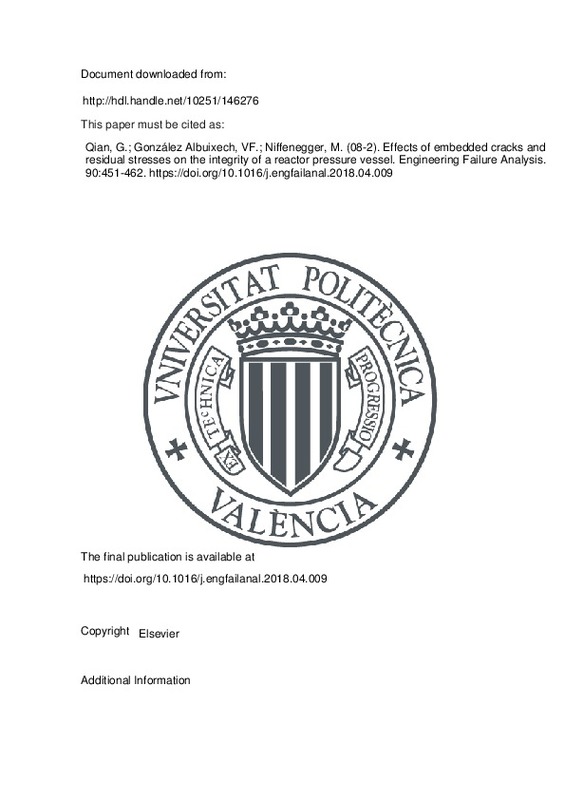JavaScript is disabled for your browser. Some features of this site may not work without it.
Buscar en RiuNet
Listar
Mi cuenta
Estadísticas
Ayuda RiuNet
Admin. UPV
Effects of embedded cracks and residual stresses on the integrity of a reactor pressure vessel
Mostrar el registro sencillo del ítem
Ficheros en el ítem
| dc.contributor.author | Qian, G.
|
es_ES |
| dc.contributor.author | González Albuixech, Vicente Francisco
|
es_ES |
| dc.contributor.author | Niffenegger, Markus
|
es_ES |
| dc.date.accessioned | 2020-06-13T03:32:27Z | |
| dc.date.available | 2020-06-13T03:32:27Z | |
| dc.date.issued | 2018-08 | es_ES |
| dc.identifier.issn | 1350-6307 | es_ES |
| dc.identifier.uri | http://hdl.handle.net/10251/146276 | |
| dc.description.abstract | [EN] One potential challenge to the integrity of the reactor pressure vessel (RPV) of a pressurized water reactor is posed by a pressurized thermal shock (PTS), which is associated with rapid cooling of sections of the hot and still pressurized RPV by injection of relatively cold emergency coolant. PTS transients lead to high tensile circumferential and axial stresses in the RPV wall. If the stress intensity factor (SIF) is large enough, a critical crack may grow. Thus, the RPV has to be assessed against cleavage fracture. In this paper, two kinds of embedded cracks, i.e. semi-elliptical and elliptical crack with depth of 17 mm and length of 102 mm are considered. The extended finite element method (XFEM) is used to model such postulated cracks. The embedded crack with tip in the cladding/base interface causes a high K-I. This is due to the stress discontinuities at the interface between the materials. In the FAVOR (probabilistic fracture mechanics code) calculation, for such cracks the point closest to the inner surface is considered in order to be conservative. However, due to the highly ductile cladding material, it is unlikely that the embedded crack will propagate through the cladding. Thus, it is more appropriate to consider the outer surface point of the crack front. The effect of welding residual stress and cladding/base interface residual stress on the crack driving force is studied. Surface cracks are assumed in the study of residual stresses. Results show that considering realistic welding residual stresses may increase K-I by about 5 MPa.m(0.5), while the cladding/base interface residual stress has a negligible effect on K-I. The reason is that the cladding residual stress is only localized to the interface and it decreases significantly through the vessel wall. Considering welding residual stress increases the Weibull stress and fracture probability of the RPV. | es_ES |
| dc.description.sponsorship | The authors are grateful for the financial support of the PROBAB Project provided by the Swiss Federal Nuclear Safety Inspectorate (ENSI) (DIS-Vertrag Nr. H-100668). V.F. Gonzalez-Albuixech is thankful for the research program Juan de la Cierva Incorporacion 2015, IJCI-2015-23245, financed by the Spanish Ministerio de Economia, Industria y Competitividad. | es_ES |
| dc.language | Inglés | es_ES |
| dc.publisher | Elsevier | es_ES |
| dc.relation.ispartof | Engineering Failure Analysis | es_ES |
| dc.rights | Reserva de todos los derechos | es_ES |
| dc.subject | Reactor pressure vessel | es_ES |
| dc.subject | Pressurized thermal shock | es_ES |
| dc.subject | Welding residual stress | es_ES |
| dc.subject | Embedded crack | es_ES |
| dc.subject.classification | INGENIERIA MECANICA | es_ES |
| dc.title | Effects of embedded cracks and residual stresses on the integrity of a reactor pressure vessel | es_ES |
| dc.type | Artículo | es_ES |
| dc.identifier.doi | 10.1016/j.engfailanal.2018.04.009 | es_ES |
| dc.relation.projectID | info:eu-repo/grantAgreement/ENSI//DIS-Vertrag Nr. H-100668/ | es_ES |
| dc.relation.projectID | info:eu-repo/grantAgreement/MINECO//IJCI-2015-23245/ES/IJCI-2015-23245/ | es_ES |
| dc.rights.accessRights | Abierto | es_ES |
| dc.contributor.affiliation | Universitat Politècnica de València. Departamento de Ingeniería Mecánica y de Materiales - Departament d'Enginyeria Mecànica i de Materials | es_ES |
| dc.description.bibliographicCitation | Qian, G.; González Albuixech, VF.; Niffenegger, M. (2018). Effects of embedded cracks and residual stresses on the integrity of a reactor pressure vessel. Engineering Failure Analysis. 90:451-462. https://doi.org/10.1016/j.engfailanal.2018.04.009 | es_ES |
| dc.description.accrualMethod | S | es_ES |
| dc.relation.publisherversion | https://doi.org/10.1016/j.engfailanal.2018.04.009 | es_ES |
| dc.description.upvformatpinicio | 451 | es_ES |
| dc.description.upvformatpfin | 462 | es_ES |
| dc.type.version | info:eu-repo/semantics/publishedVersion | es_ES |
| dc.description.volume | 90 | es_ES |
| dc.relation.pasarela | S\356982 | es_ES |
| dc.contributor.funder | Eidgenössisches Nuklearsicherheitsinspektorat | es_ES |
| dc.contributor.funder | Ministerio de Economía y Competitividad | es_ES |







![[Cerrado]](/themes/UPV/images/candado.png)

